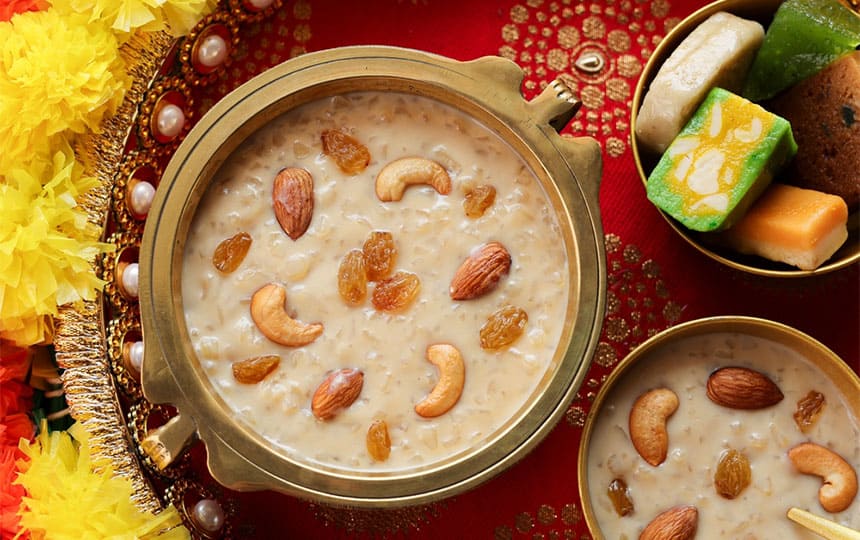What Foods You Can Eat and What Not to Eat During Navratri
Navratri is one of the most widely celebrated Hindu festivals, and it holds great spiritual and cultural significance. During the nine days of devotion to Goddess Durga, many devotees observe fasting as a way to purify their body and mind. However, it's not just about abstaining from food—it’s about knowing what to eat and what to avoid to maintain both physical health and spiritual discipline. In this blog, we’ll explore what can be eaten during Navratri fasting and what foods to avoid, ensuring that your fasting experience is fulfilling, healthy, and in line with tradition.
What Can Be Eaten in Navratri Fast?
Fasting during Navratri doesn’t mean you have to starve. The idea is to eat sattvic (pure) foods that align with spiritual discipline. Here are the foods you can eat during Navratri fasting:
Fruits and Fruit Juices
Fruits are the most commonly consumed food during Navratri. They are not only nutritious but also keep you energized throughout the day. You can have a variety of fruits like bananas, apples, papayas, and pomegranates. Fresh fruit juices (without sugar) are also a great option for hydration and maintaining energy levels.
Dairy Products
Dairy products like milk, paneer (cottage cheese), curd (yogurt), and ghee (clarified butter) are allowed during Navratri fast. They are rich in proteins and healthy fats, helping you stay full and energized. You can prepare simple dishes like kuttu ki puri or singhara ki roti using ghee, or enjoy a bowl of curd with fruits.
Sabudana (Tapioca Pearls)
Sabudana is a popular choice during Navratri fasting. It's light on the stomach and rich in carbohydrates, which gives you the energy needed to stay active throughout the day. Dishes like Sabudana Khichdi or Sabudana Vada are not only filling but also delicious.
Buckwheat Flour (Kuttu Atta)
One of the most common ingredients used during Navratri fasting is buckwheat flour, known as Kuttu Atta. It’s gluten-free and loaded with essential nutrients. You can make Kuttu Ki Puri or Kuttu Ka Halwa to satisfy your hunger during the fast.
Samak Rice (Barnyard Millet)
If you’re craving rice during Navratri, Samak Rice is the best alternative. It’s a type of millet that resembles rice but is gluten-free and light on the stomach. You can prepare it like regular rice with a curry or even as a sweet dish like Samak Rice Kheer.
Dry Fruits and Nuts
Dry fruits like almonds, cashews, raisins, and walnuts are highly recommended during Navratri. They are rich in essential fats, proteins, and minerals, providing a quick energy boost. You can snack on these throughout the day or add them to your meals for extra flavor and nutrition.

Rock Salt (Sendha Namak)
During Navratri fasting, regular salt is avoided, and Sendha Namak (rock salt) is used instead. Rock salt is unrefined and considered a purer form of salt, which aligns with the principles of Navratri fasting.
What Not to Eat During Navratri Fasting?
Just as there are specific foods you should eat during Navratri, there are also certain foods you must avoid. These foods are considered tamasic or rajasic (impure or overly stimulating) and should be excluded from your diet to maintain spiritual purity.
Grains and Pulses
One of the most important rules during Navratri fasting is to avoid grains like wheat, rice, and lentils. Instead, alternatives like buckwheat flour and barnyard millet are used. Lentils and pulses are also avoided during the fast as they are believed to increase lethargy.
Onion and Garlic
Onion and garlic are considered tamasic foods, which are believed to increase passion and negativity. They are strictly avoided during Navratri as they are thought to distract devotees from their spiritual practices. All food preparations during the fast should be free from onions and garlic.
Non-Vegetarian Food
Navratri is a time for spiritual discipline and purity, and consuming non-vegetarian foods goes against this principle. Meat, fish, eggs, and poultry should be completely avoided. This period emphasizes a vegetarian diet that promotes peace and mindfulness.
Alcohol and Caffeine
Alcohol and caffeinated drinks like coffee should also be avoided during Navratri fasting. These substances can disturb your spiritual balance and cause dehydration. Instead, stick to herbal teas, water, and fresh fruit juices to stay hydrated.
Regular Salt (Table Salt)
As mentioned earlier, regular table salt is not allowed during Navratri. Instead, you should use rock salt (Sendha Namak) for cooking. Table salt is considered impure for fasting as it undergoes several refining processes.
Additional Tip For Navratri Rules for Couples
If you're fasting as a couple, there are specific guidelines that couples should follow to maintain the sanctity of the fast:
- Physical Intimacy: Couples are advised to refrain from physical intimacy during Navratri as it is a period dedicated to spiritual growth and devotion.
- Support Each Other: Fasting can be challenging, so couples need to support each other spiritually by performing rituals, pujas, and prayers together.
- Maintaining Discipline: Following the food restrictions together as a couple strengthens your bond and helps maintain the spiritual discipline that Navratri requires.

Conclusion: What Foods to Eat and What Not to Eat
Navratri is a period of spiritual growth and physical detoxification. By knowing what can be eaten during Navratri fast and what not to eat during Navratri fasting, you can ensure a smooth and fulfilling fasting experience. Including sattvic foods like fruits, dairy, and buckwheat flour in your meals will keep you energized, while avoiding tamasic foods like onions, garlic, and non-vegetarian items will help maintain the purity of your fast.
If you’re uncertain about what to eat or how to maintain your fasting discipline, consulting an astrologer can provide personalized advice. You can easily connect with experts through Online Astrology services on the best astrology website in India to guide you through the process. Stay healthy, stay spiritual, and may Goddess Durga bless you with peace and prosperity during Navratri.
FAQs: What Foods You Can Eat and What Not to Eat During Navratri
What can be eaten during the Navratri fast?
During Navratri fast, you can eat sattvic foods like fruits, dairy products (milk, curd, paneer), sabudana, buckwheat flour (kuttu atta), barnyard millet (samak rice), and dry fruits. Use rock salt (Sendha Namak) for seasoning.
What food to avoid during Navratri?
You should avoid grains (wheat, rice), lentils, onions, garlic, non-vegetarian food, alcohol, and regular salt (table salt) during Navratri fasting.
Can we drink tea or coffee during Navratri fasting?
It's best to avoid caffeinated drinks like tea and coffee during Navratri as they can cause dehydration. Opt for herbal teas, warm water, or fresh fruit juices instead.
What are the benefits of fasting during Navratri?
Fasting during Navratri not only purifies the body but also helps in detoxification. It promotes mindfulness, discipline, and spiritual growth. Fasting on sattvic foods can also improve digestion and boost immunity.
Is it necessary to follow strict fasting rules?
While it’s ideal to follow the traditional rules of fasting, it’s important to listen to your body. If you have any health conditions or need personalized guidance, you can consult an astrologer through Online Astrology services on the best astrology website in India.
Embrace the spirit of Navratri by following these food guidelines and enjoy the festival with health, devotion, and spiritual bliss!
For more astrology-related content, subscribe to us on Youtube
